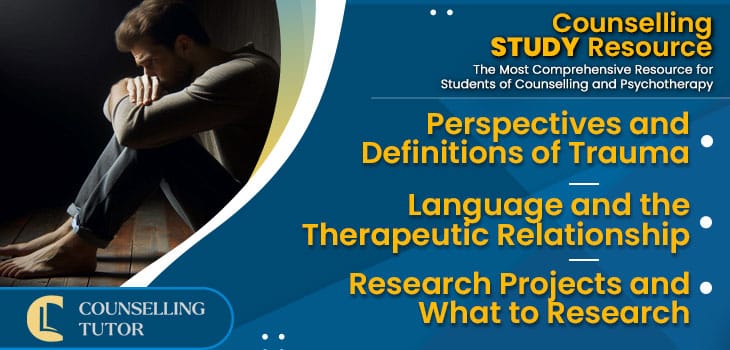314 - Perspectives and Definitions of Trauma
Language and the Therapeutic Relationship - Research Projects and What to Research
In Episode 314 of the Counselling Tutor Podcast, your hosts Rory Lees-Oakes and Ken Kelly take us through this week’s three topics:
- Firstly in ‘Ethical, Sustainable Practice’, we look at understanding the diverse perspectives and definitions of trauma.
- Then in ‘Practice Matters’, Rory speaks with Nadine Pittham about how our use of language can develop and strengthen the therapeutic relationship.
- And lastly in ‘Student Services’, Rory and Ken talk about research projects, and more specifically, what should you research?
Perspectives and Definitions of Trauma [starts at 03:19 mins]
This segment of the Counselling Tutor Podcast is sponsored by
WebHealer.net
- WebHealer are the go-to provider of websites for private practitioners in the UK.
- Established over 20 years, WebHealer offers a non-technical and fully supported service to help therapists grow their private practice.
- Just one customer from your website each year pays for their service.
Go to WebHealer.net and use coupon CT100 for £100 off their "Do it for me" service.
Working with trauma requires extra consideration due to its complexities. In this section, Rory and Ken look at the diverse perspectives and definitions of trauma that exist and why it’s so important that we’re aware of them:
- There is diversity and complexities in trauma.
- If someone is attacked for who they are or their beliefs, there is an element of dual burden – first, there is the trauma of the attack itself, then there is the trauma of acknowledging that they were attacked just because of who they are.
- This will usually be experienced through harassment, discrimination, hostility, and a rejection of otherness or the individuality of the person.
- Trauma can also come as a result of relationships, whether that be with a romantic partner, through marriage, or family relationships.
- Trauma can be unseen to self as well as to others.
- Small events in life can be traumatic to an individual, and it can put our bodies and minds on high alert to be back in a similar environment or situation.
Theory to Practice is sponsored by
Counselling Skills Academy
Learn counselling techniques by seeing counselling skills used in real sessions by qualified therapists.
Real sessions – real-life presentations – real skills.
Language and the Therapeutic Relationship [starts at 19:22 mins]
In this week’s ‘Practice Matters’, Rory speaks with Nadine Pittam about how our use of language can develop and strengthen the therapeutic relationship.
The key points of this conversation include:
- Language does more than convey fact.
- When we meet a client, we use language to build a world that exists between us that becomes textured – it becomes a place where the client can feel safe and respected.
- This language starts immediately – from that first email correspondence.
- Acknowledge their position - if you make a mistake or miss where the client is, acknowledge that.
- You’re working on this together, invite the client to correct you if you’re wrong.
- Creating a metaphor between you and the client – something that is bespoke and tailored to their experience, and your therapeutic relationship.
- Talking in metaphor can externalise the problem for the client.
Counselling Study Resource:
Assignment Guidance & Study Support for Counselling Students
- Academic Lecture Library - Lectures that cover key theory, skills and professional development linked to your counselling study.
- Assignment Guidance - Complete assignment exemplars and portfolios of work that have been passed by both tutors and awarding bodies.
- Theory Decoded, Skills Mastery and More - Counselling theories and skills are broken down into easy-to-understand ‘chunks’, with clear examples to guide you.
Research Projects and What to Research [starts at 42:27 mins]
Throughout your counselling journey, you will need to complete a research project. In this section, Rory and Ken look at how you might go about choosing what to research:
- Your project needs to be manageable and doable - how long have you got from thinking about what to do your project on, to handing it in?
- Going too niche might mean it’s very difficult to find or gain access to the information and research you need.
- Firstly, you’ll need ethical approval, then you need to work out your methodology – will you be looking at qualitative or quantitative research?
- For a smaller research project, think about if there is a specific area you want to work with when you graduate, what are your interests for further development?
- Just because a topic has been covered, doesn’t mean you can’t look at it again with fresher eyes.
- Can you bring a unique angle to your research?
Get on-demand Certified CPD that is implementable in your practice
Counsellor CPD Library
- Over 150 hours of on-demand CPD lectures to help you stay current with your CPD ethical requirements
- Support, and be supported, by thousands of other counsellors as a member of the exclusive online community.
- Access your learning anytime you want ... anywhere you choose ... using any device type — desktop or mobile.

Free Handout Download
Diverse Perspectives and Definitions of Trauma
